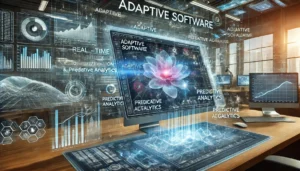Adaptive software is transforming technology by enabling systems to evolve based on user needs and real-time data. Its flexibility ensures seamless integration across industries, improving efficiency and decision-making. With a strong framework and ethical methodology, it enhances user experiences while maintaining reliability, adaptability, and long-term sustainability in software development.
The Rise of Adaptive Software: Revolutionizing Digital Assistants with Emotional Intelligence
The evolution of digital assistants has transformed human interaction with technology. Traditional systems relied on fixed responses, but modern adaptive software brings a new level of intelligence by processing real-time data and understanding user emotions. This agile approach allows systems to automate responses dynamically, making interactions more natural and intuitive. As these assistants integrate seamlessly into daily life, they enhance productivity while adapting to individual needs.
At the core of this transformation lies the science behind emotional intelligence. Adaptive software utilizes complex algorithms to recognize patterns in human communication, adjusting interactions accordingly. By learning from previous engagements, these systems evolve to provide better, context-aware responses. Unlike rigid traditional programs, adaptive solutions respond in real-time, ensuring meaningful and relevant exchanges. This innovation not only improves efficiency but also creates a more personalized user experience, bridging the gap between technology and human emotion.
Human-Computer Interaction and Ethical Challenges in Emotionally Adaptive Software Development
Digital assistants gain their emotional intelligence through the fundamental component of Human-Computer Interaction (HCI). The analysis of user behavior together with their responses allows adaptive software to create smart interfaces that adapt accordingly. Workday along with other professional settings implements assistants to simplify work activities and enhance decision-making capabilities. The development of effective software leads digital assistants to detect user emotions without compromising accuracy factors and efficiency levels thus enhancing overall engagement in personal and professional domains.
The evolution of emotionally intelligent assistants depends on the usage of strong technological advancements. Software systems use natural language processing and machine learning and behavioral analytics to enhance user interaction processing. The technologies in solutions such as Workday Adaptive Planning help enhance workflow efficiency through user need predictions. The combination of adaptable development processes enables digital assistants to develop through time while providing real-time insights which make them highly beneficial to businesses working within financial sectors and healthcare facilities.
These systems lead to multiple important privacy and ethical issues despite their benefits. Software development continues to progress which causes user data protection to emerge as a critical requirement. The implementation of emotionally adaptive software requires full transparency and accountability systems in order to avoid improper use. Workday Adaptive Planning and comparable platforms require organizations to keep their data compliance measures up to date. The development process must ensure responsible innovation because it enables users to have confidence in emotionally intelligent digital assistants which integrate ethical considerations.

Enhancing Personalization and Ethical Decision-Making in Emotionally Adaptive Software
Emotionally intelligent digital assistants rely on adaptive software to personalize interactions and understand context. This level of adaptability is essential in industries such as healthcare, finance, and customer service. Platforms like Workday US leverage these systems to enhance business planning by predicting user needs. In software engineering, maintaining software quality ensures that digital assistants provide precise, context-aware responses, improving decision-making and user experience across various applications.
While personalization improves efficiency, overcoming bias in emotionally adaptive software is crucial for ethical implementation. The ASD (Adaptive Software Development) approach focuses on refining decision-making to minimize biases in data interpretation. Ethical standards in software engineering ensure that these systems remain fair and inclusive. Organizations like Workday US prioritize transparency and responsible business planning, ensuring that emotionally intelligent software respects privacy while delivering valuable insights without compromising user trust.
The Future of Emotionally Intelligent Digital Assistants: Balancing Innovation with Ethical Responsibility
The evolution of emotionally intelligent digital assistants depends on a strong framework that enhances their ability to interpret human emotions accurately. Future advancements in adaptive software will refine user interactions, making digital assistants more responsive and intuitive. By applying structured methodology and ethical guidelines, these systems can better support industries like healthcare and finance, ensuring efficiency while maintaining user trust. Proper budget allocation for research and development is crucial to driving innovation responsibly.
A key debate in this field is whether machines can truly understand human emotions. While adaptive software can simulate empathy through pattern recognition, the absence of genuine human experiences creates limitations. Implementing agile software development principles allows for continuous improvement, but true emotional depth remains unique to humans. Ensuring that software remains a tool rather than a replacement for human connection is a responsibility that must be shared by every stakeholder involved.
As emotionally intelligent assistants become more advanced, striking a balance between innovation and ethical responsibility is critical. A well-defined framework ensures that these technologies serve human needs without overstepping ethical boundaries. Organizations must adopt transparent methodology to guide responsible development while maintaining fairness. By considering the needs of every stakeholder, we can shape the future of adaptive software in a way that benefits both technology and humanity.



3 Comments
Your words are powerful! Have you tried Sprunki Phase? It’s power unleashed.
Fascinating discovery! Have you noticed how Dinosaur Game improves hand-eye coordination?
Cultural codex! The Sprunki Katchup expansion serves spicy global music fusion recipes.